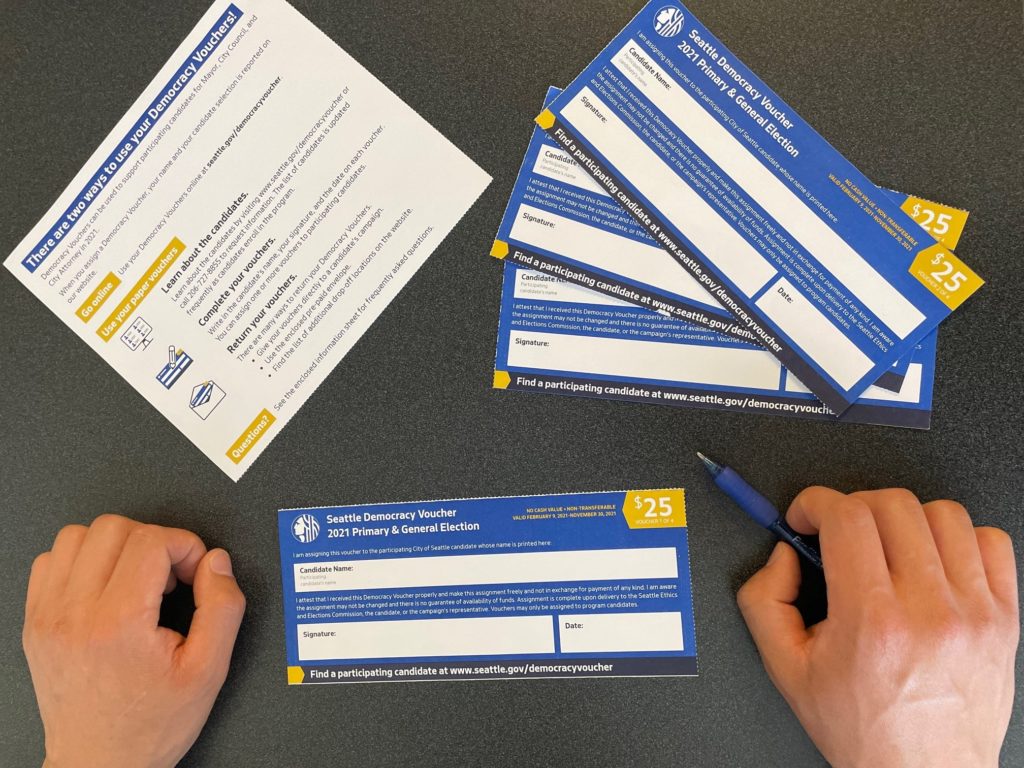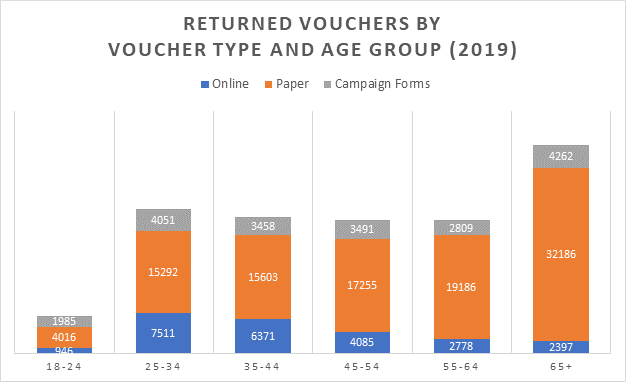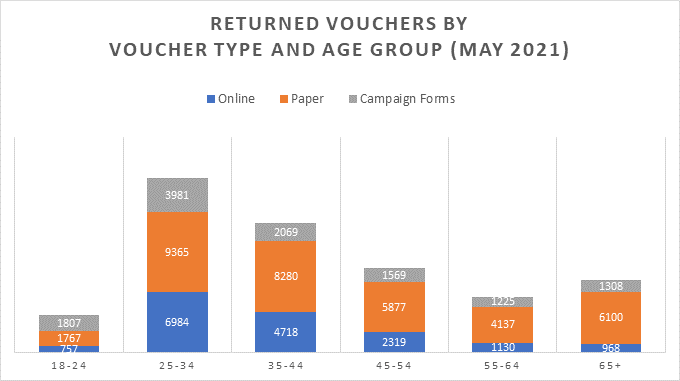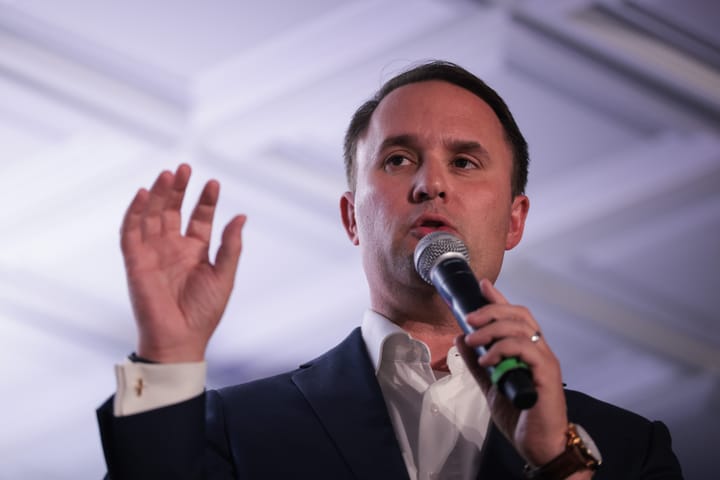In Seattle, the Aug. 3 primary election will feature the first race for mayor since the city launched a unique system of public campaign financing in 2017.
All of the leading candidates for Seattle mayor opted in to the public financing program, including two new candidates who have relied heavily on the program’s “democracy vouchers” to raise money from grassroots donors. The two have already raised and received the maximum amount of $400,000 that they are allowed to spend during the primary, giving them more time to campaign instead of fundraising from typical donors.
Several veteran Seattle politicians in the race are also using democracy vouchers for a large share of their fundraising, as the city sees an uptick in voucher use in a crowded mayoral field.
Under the Seattle program, four democracy vouchers worth $25 apiece are mailed to every registered city voter, who can then donate them to qualifying candidates in the primary and general elections. The top two vote-getting candidates in the nonpartisan mayoral primary—an open seat, after Mayor Jenny Durkan surprised some by announcing in December that she would not be running for reelection—advance to the Nov. 3 general election. In this year’s election, Seattle voters can sign over their paper vouchers, or issue them digitally, to hopefuls for mayor, two at-large city council positions, and city attorney.
Candidates who accept the vouchers agree to abide by contribution limits and disclosure requirements, and the voucher funding awarded to each campaign is transparently displayed on the website of the Seattle Ethics and Elections Commission (SEEC), an independent committee of volunteers supported by city employees.
A total of fifteen candidates are running in the primary for Seattle mayor, with a pack of eight better-known names—all of whom opted in to the public financing program, which stipulates they can only take donations of $550 or less from individuals and cannot spend more than $400,000 in each of the the primary and general elections.
The program was adopted by city voters in a Nov. 2015 ballot initiative called Honest Elections Seattle and is designed to increase participation in the campaign finance system, while also encouraging candidates to run for office who don’t already have a wealthier base of supporters to fund their campaigns. In its second run in the 2019 cycle, with races eligible in each of the city’s seven council districts, overall voucher use doubled compared with the 2017 cycle, with nearly 7% of the voting age population sending vouchers to candidates. In addition, voucher users continued to make strides in being more representative of Seattle’s population in terms of age, race, and income, according to research by professors Jen Heerwig and Brian J. McCabe. For example, voucher users under 40 years of age made up a higher share of donors than traditional cash donors in nearly all seven council districts last cycle, making voucher donors more reflective of the city’s residents by age. Voucher use continued to rise last cycle among Black and Asian residents, though more modestly than the increase among white residents; the program’s supporters note continued community outreach efforts to lower-income people and historically-marginalized groups.

Wayne Barnett, the executive director of SEEC, says that again this year, an increasing number of Seattle residents are using vouchers to have a say in the political process. “The goal from the start was to increase the number of candidates and the number of contributors, and for the third straight cycle that’s what we’re seeing happen,” Barnett told Sludge. The program’s design encourages “getting people out of conference rooms ‘dialing for dollars’ and moving in the community,” as Barnett put it, and as the city’s public health orders begin to change in response to lower COVID rates, voucher giving has picked up.
The higher-profile mayor’s race, with higher amounts of public funding at stake, has inspired more Seattleites to make use of their vouchers. In 2021, SEEC has distributed $1,325,425 in voucher funds to eight campaigns that qualified, including three City Council campaigns. According to the most recent data, SEEC has received 87,084 vouchers from 22,878 Seattle residents, a 15% increase in voucher returns compared to this point in the 2019 cycle.
In one early change from last cycle, younger voters in the age range 25-34 lead the way in returning their vouchers, outperforming voters age 65+, who signed over the most vouchers in the previous cycle. Barnett says that the city has focused on making the program “more accessible to communities that are historically underserved and young.” About a quarter of the vouchers submitted so far have been given through an online portal that authenticates the registered voter’s identity and allows them to allocate vouchers digitally, a tool that SEEC has promoted in part as “going green” and paper-free.


Top Fundraisers Rely on Vouchers
Two mayoral hopefuls who have received the $400,000 spending cap for the primary—with the vast majority of their donations coming from vouchers—are making their first forays as candidates: nonprofit executive Colleen Echohawk and urban designer Andrew Grant Houston. Echohawk recently headed up the Native-led human services agency Chief Seattle Club, and Houston has introduced himself as a “queer Black and Latino architect.”
Echohawk’s campaign has received over 78% of its funding toward the $400,000 spending cap from vouchers, and Houston’s campaign has received almost 87%, according to SEEC data. Echohawk’s bid has focused on social media and email appeals to bring in vouchers, while Houston’s strategy has focused on paid canvassers and outdoor tabling, the Seattle Times reported last month.
Mayoral candidate Lorena González, currently president of the Seattle City Council as an at-large member, opted in again to the public financing program after participating in her 2017 reelection. This year, González, previously a civil rights attorney, brought in nearly 69% from vouchers of her over $310,000 in mayoral primary funding raised, as of data from June 14. Former City Council president Bruce Harrell has raised about the same amount, nearly $319,000, with almost 36% coming from vouchers.
Echohawk and Houston lead in number of voucher contributors, with 5,685 and 5,408 respectively, while González’s 4,405 voucher donors comes close to doubling those of Harrell, who has 2,426 as of June 14.
Heather Weiner is a progressive political consultant in Seattle who is a general consultant for González’s campaign this year and previously worked on passing the Honest Elections initiative that created the democracy voucher program. “We knew that under Citizens United we couldn’t limit corporate money in campaigns and spending on independent expenditures,” Weiner told Sludge. “In response, we ran a ballot initiative that gives candidates who do not have access to a Rolodex the ability to run for office by getting money from regular voters, particularly those who don’t usually give money to candidates.
“Is it working? Hell yes it is,” Weiner said. “A couple of campaigns without Rolodexes are doing an amazing job of using the system, and doing it in unique ways.
“One of the great outcomes of the voucher program was to help people who have been marginalized connect with candidates and election outcomes,” Weiner said. She also noted that Seattle was the fastest-growing big city last year by population, and that moving residents from awareness of municipal elections to voter engagement takes time.
“It’s leveling the playing field between candidates, with the spending cap and contribution cap,” Weiner said. “We are happy to have candidates running on their records, not how much in contributions they are getting from their Rolodexes.”
Nearly all the leading candidates are touting themselves as reformers on city issues including police accountability, housing prices, and homelessness. Other candidates for mayor include former State Representative Jessyn Farrell, who has received over $72,000 from vouchers, over half her total raised, and three candidates who have not yet been awarded funding from vouchers. They are businessperson Art Langlie, economic development professional Lance Randall, and Seattle Deputy Mayor Casey Sixkiller. With the limitations of in-person campaigning during the Covid pandemic, some of their voter outreach has been happening online, such as in digital town halls.
“I would say that without the democracy voucher program, I would not be able to run my campaign,” Houston told the Seattle Times.
Business Interests Shift Strategy
Seattle’s 2019 council races were intensely contested, with outside groups including Amazon and large business associations spending over $4.1 million for and against candidates—six times more than outside groups spent in the 2015 election—as the city weighed a $15 minimum wage proposal. In six of the contests where Amazon and the PAC of the Seattle Chamber of Commerce battled a progressive, only one of their favored candidates won, amid high voter turnout in a backlash to outsized corporate spending.
In contrast to corporate spending, the Democracy Voucher Program is funded through $3 million per year in property taxes, costing the average homeowner about $8 per year.
In Jan. 2020, the Seattle City Council passed a ban on political spending by “foreign-influenced corporations,” applying to corporations with a single non-United States investor holding at least 1% ownership—which includes Amazon, and also prevents the corporate giant from routing its spending through allied PACs. After the blowback to their massive spending in 2019, Amazon and the city business lobby have not doubled down on millions in independent expenditures, leaving only two independent expenditure committees in play in the mayor’s race, groups supporting Harrell and González.
While the city’s business interests are spending less on influencing individual races, Seattle donors with ties to the business lobby are donating in droves to a ballot initiative on homelessness called Compassion Seattle. Launched last month, the ballot measure would amend the City Charter to set funding levels such as spending 12% of the general fund on social services and creating 2,000 units of emergency housing as a precursor to clearing encampments on streets and in parks. The ballot issue campaign has raised over $850,000 from a long list of real estate industry donors, with the largest contributions coming from commercial real estate firms including Urban Visions, employees of Goodman Real Estate, investment firm Silver Creek Advisory Partners, and business group Downtown Seattle Association, a prominent backer of the initiative. Employees of Amazon, Microsoft, and Zillow made donations to the initiative, companies that also have executives on the Seattle Metropolitan Chamber of Commerce’s Board of Directors.
Seattle urbanist Katie Wilson wrote last month that the measure’s assurances of adequate existing funding for social services are “highly dubious,” and that it would codify controversial clearing practices without making them able to be amended by the City Council in the future. Members of a homelessness advocate coalition called House Our Neighbors! wrote an op-ed this month calling it a step backward, enshrining sweeps of encampments in the charter without providing dedicated resources to address the root causes of homelessness.
Of the voucher program, Wayne Barnett said, “It’s becoming part of the fabric of campaigning in Seattle.”



